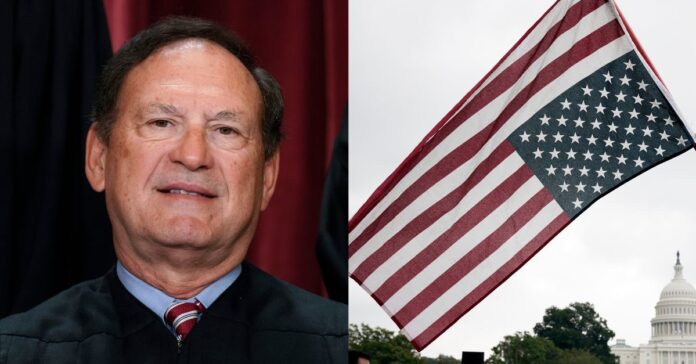A federal district judge found himself in hot water after criticizing a U.S. Supreme Court justice in a published essay. The judge, Michael Ponsor, wrote about what he saw as a bad decision by Justice Samuel Alito to fly a controversial flag outside his home shortly after the January 6 Capitol riot.
The story starts in Alexandria, Virginia, where an upside-down flag was displayed outside Alito’s home on January 17, 2021. This was just days after the insurrection, and many people interpreted the flag as supporting claims of election fraud in the 2020 presidential race. The timing of the display stirred anger, especially since the Supreme Court was considering a case about Donald Trump’s presidential immunity. That case ultimately ended in July, with the court deciding that Trump couldn’t be prosecuted for actions taken while president. The case was later dropped after Trump won the November 2024 election.
Alito told the media that he had nothing to do with the flag and explained it was briefly put up by his wife. According to Alito, the flag was her response to a neighbor’s offensive yard signs.
Enter Judge Michael Ponsor, a senior U.S. District Judge in Massachusetts, appointed by Bill Clinton. On May 24, 2024, Ponsor published an essay in a major media outlet titled “A Federal Judge Wonders: How Could Alito Have Been So Foolish?” In the piece, Ponsor didn’t hold back, calling the display of the flag improper and, in his words, “dumb.” He also criticized Alito for flying another flag, an “Appeal to Heaven” banner, at his vacation home in New Jersey, which is often linked to partisan movements.
Ponsor’s essay sparked a strong reaction. A conservative advocacy group led by Trump ally Mike Davis filed a misconduct complaint against him, arguing that Ponsor had crossed ethical boundaries by commenting on politically sensitive matters. The complaint was reviewed by Chief U.S. Circuit Judge Albert Diaz of the Virginia-based 4th Circuit Judicial Council, an appointee of Barack Obama.
Judge Diaz ruled that Ponsor had indeed violated judicial ethics rules. He pointed out that Ponsor’s essay had political undertones and commented on cases that could come before the courts. However, the matter was resolved without severe consequences after Ponsor issued an apology. In a letter to Diaz, Ponsor admitted he made a mistake and apologized without reservation. He acknowledged that his essay could be seen as pressuring Alito to step away from certain cases. Ponsor also promised to consult with a judicial panel before writing anything like this again.
Diaz accepted Ponsor’s apology, stating that it was enough to close the case.
This didn’t sit well with everyone. Josh Sorbe, a spokesperson for U.S. Senate Majority Whip Dick Durbin, called the decision hypocritical. Sorbe pointed out that while Alito faced no repercussions for actions that cast doubt on his impartiality, Ponsor was disciplined for calling it out. Sorbe also noted that federal judges, including Ponsor, are held to an enforceable code of conduct, unlike Supreme Court justices, who don’t have the same rules.
The debate highlights a growing demand for stricter ethics reforms at the Supreme Court. Senate Judiciary Committee Democrats say they won’t stop pushing for changes to ensure accountability across all levels of the judiciary.



























